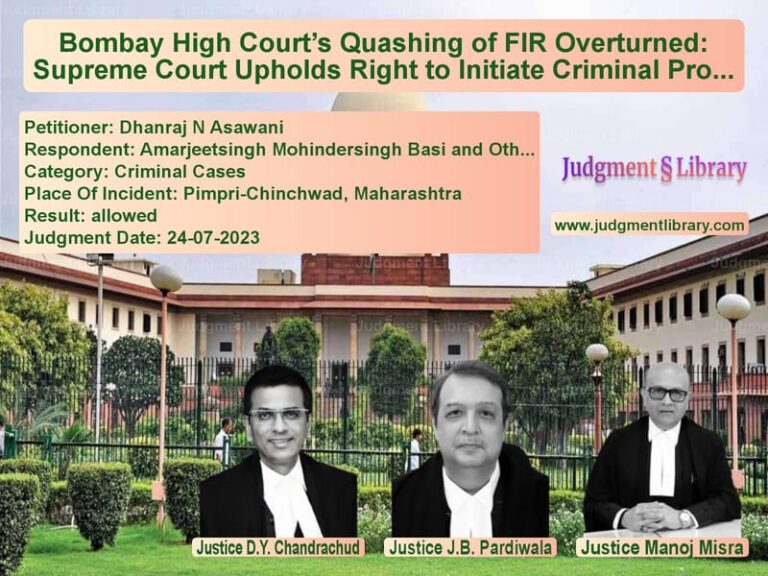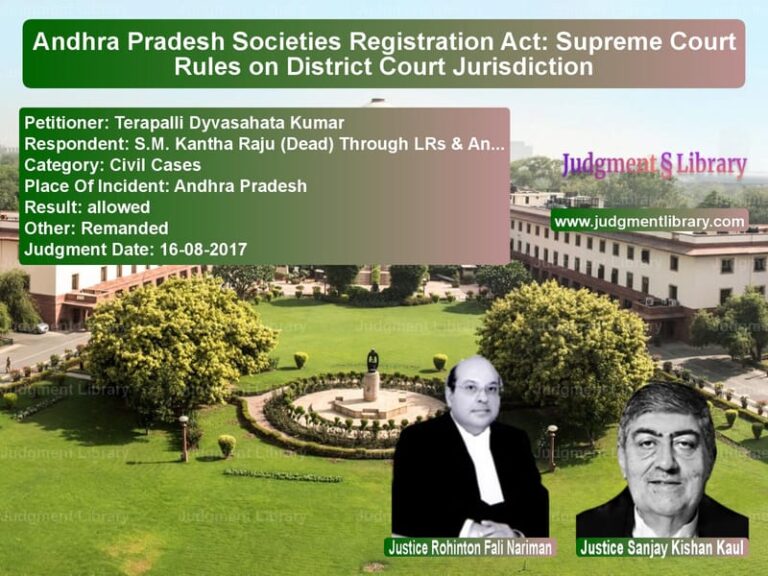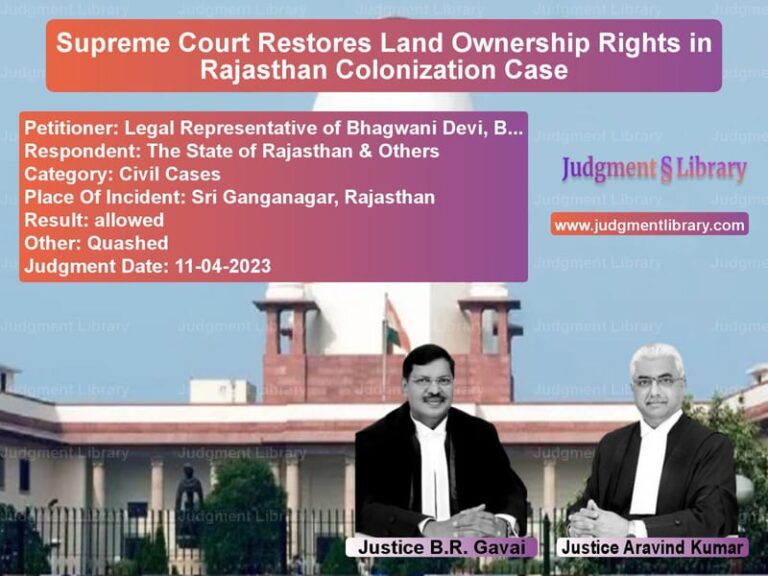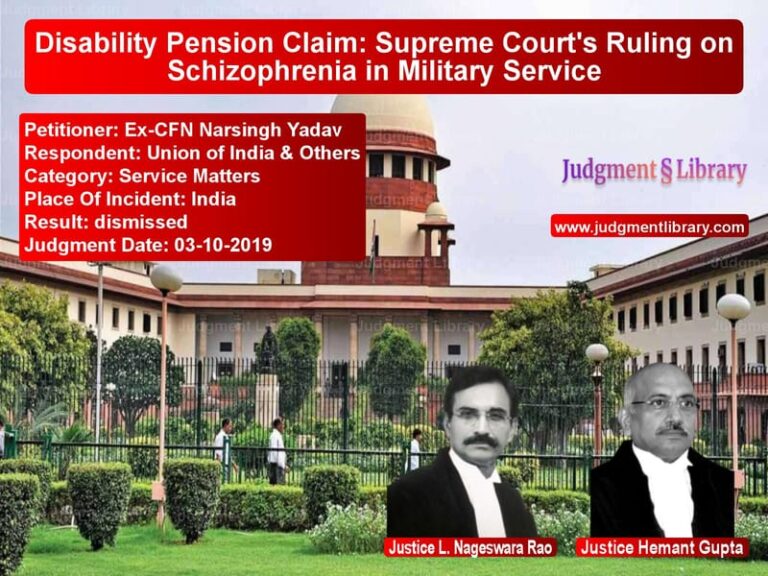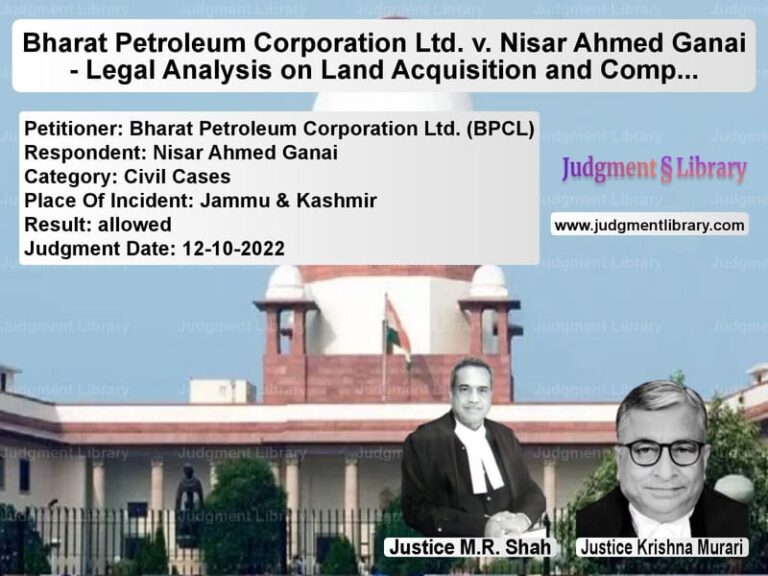Supreme Court Orders Regularization of Contract Workers in Mahanadi Coalfields Ltd.
The Supreme Court of India has upheld the regularization of 13 contract workers employed at Mahanadi Coalfields Ltd., a subsidiary of Coal India Ltd., ruling that their nature of work was perennial and essential to coal mining operations. The case, Mahanadi Coalfields Ltd. vs. Brajrajnagar Coal Mines Workers’ Union, arose from a long-standing labor dispute concerning the employment status of contract workers who had been engaged in coal handling operations for nearly a decade.
The Court rejected Mahanadi Coalfields Ltd.’s contention that these workers were engaged in ‘casual’ tasks and affirmed the findings of the Industrial Tribunal and Orissa High Court that their work was of a permanent nature. It also directed the payment of back wages from May 23, 2002, the date of the Tribunal’s original order.
Background of the Case
The dispute centered around contract workers employed between 1984 and 1994 for handling coal spillage and operating coal chutes at the Brajrajnagar mines in Odisha. The workers were engaged through a contractor under a transportation agreement for the transfer of crushed coal.
In 1994, the Brajrajnagar Coal Mines Workers’ Union raised a demand for these workers to be regularized, citing clauses 11.5.1 and 11.5.2 of the National Coal Wage Agreement-IV (NCWA-IV), which prohibited the engagement of contract labor for jobs of a permanent and perennial nature.
Chronology of Legal Proceedings
1. Conciliation and Partial Settlement (1997)
- The Assistant Labour Commissioner initiated conciliation proceedings.
- A settlement was reached on April 5, 1997, under Rule 58 of the Industrial Disputes (Central) Rules, 1957.
- Out of 32 contract workers, 19 workers were regularized as General Mazdoor, Category-I, in the NCWA-V pay scale.
- The remaining 13 workers were denied regularization on the grounds that their work was ‘casual’ and not of a permanent nature.
2. Industrial Tribunal Rourkela (2002)
- The Central Government referred the dispute to the Industrial Tribunal, Rourkela, under Section 10(2A)(1)(d) of the Industrial Disputes Act, 1947.
- After examining evidence from both parties, the Tribunal ruled on May 23, 2002, that the work performed by the remaining 13 workers was also perennial and ordered their regularization.
3. Orissa High Court (2021)
- Mahanadi Coalfields Ltd. challenged the Tribunal’s order in the Orissa High Court.
- The High Court upheld the Tribunal’s decision, stating that no distinction could be made between the workers who were regularized in 1997 and those denied regularization.
- A review petition filed by Mahanadi Coalfields Ltd. was also dismissed on November 11, 2021.
4. Appeal to the Supreme Court (2024)
- Mahanadi Coalfields Ltd. filed an appeal before the Supreme Court, arguing that:
- The settlement of 1997 was binding under Section 18(1) read with Section 36 of the Industrial Disputes Act.
- The workers were employed by a contractor and were not under the direct supervision of the company.
- The grant of back wages was unjustified as the workers had alternative employment.
Supreme Court’s Key Observations
1. Perennial Nature of Work
“The Tribunal’s findings establish that all 32 workers performed the same tasks, which were regular and perennial. The exclusion of 13 workers from regularization is unjustified.”
2. No Justification for Different Treatment
The Court observed that Mahanadi Coalfields Ltd. had regularized 19 workers performing identical tasks, while arbitrarily denying the same benefit to 13 others.
“The settlement itself recognized that 19 workers engaged in the bunker and railway siding were performing permanent jobs. The evidence on record establishes that the remaining 13 workers were similarly placed.”
3. Role of the Industrial Tribunal
“The Tribunal was bound by the government’s reference and was justified in adjudicating the dispute independently. The employer cannot rely on a partial settlement to deny workers their legitimate rights.”
4. Grant of Back Wages
The Supreme Court upheld the Tribunal’s decision to grant back wages but limited them to the period starting from May 23, 2002, rather than from the date of termination.
“Considering the long-drawn litigation and its impact on both parties, back wages shall be calculated from the Tribunal’s decision date.”
Final Verdict
The Supreme Court dismissed the appeal and ruled:
“The appeals are dismissed. The concerned workmen shall be entitled to back wages from May 23, 2002, with no further restrictions on their regularization.”
Conclusion
The Supreme Court’s ruling reinforces key labor law principles:
- Contract labor laws must be upheld – Permanent and perennial jobs cannot be outsourced.
- Arbitrary exclusion of workers is unjustified – Employers cannot selectively regularize workers performing identical tasks.
- Industrial Tribunals have full jurisdiction – Once a matter is referred, they must adjudicate independently.
- Back wages should be fair and just – While compensation is justified, it should not be excessive.
This judgment sets a strong precedent for contract workers seeking fair treatment and prevents employers from misusing settlements to deny permanent employment benefits.
Petitioner Name: Mahanadi Coalfields Ltd..Respondent Name: Brajrajnagar Coal Mines Workers’ Union.Judgment By: Justice Pamidighantam Sri Narasimha, Justice Sandeep Mehta.Place Of Incident: Brajrajnagar, Odisha.Judgment Date: 12-03-2024.
Don’t miss out on the full details! Download the complete judgment in PDF format below and gain valuable insights instantly!
Download Judgment: mahanadi-coalfields-vs-brajrajnagar-coal-mi-supreme-court-of-india-judgment-dated-12-03-2024.pdf
Directly Download Judgment: Directly download this Judgment
See all petitions in Employment Disputes
See all petitions in Public Sector Employees
See all petitions in Judgment by P.S. Narasimha
See all petitions in Judgment by Sandeep Mehta
See all petitions in dismissed
See all petitions in supreme court of India judgments March 2024
See all petitions in 2024 judgments
See all posts in Service Matters Category
See all allowed petitions in Service Matters Category
See all Dismissed petitions in Service Matters Category
See all partially allowed petitions in Service Matters Category


